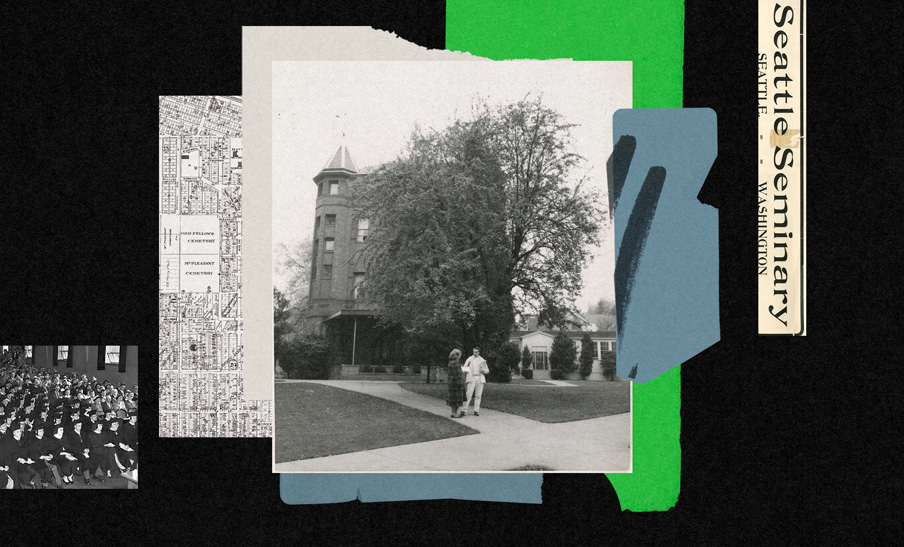
Illustrations by Mark Harris
All of us may flirt occasionally with the prospect of a job change. But when you actually receive an invitation to interview, the theoretical mind game becomes a real possibility. For me, such an invitation caused me to go into serious and frenzied discernment mode, particularly since it meant a cross-country move.
Why disrupt what was comfortable? My spouse and I had enjoyable jobs. Our two kids and elderly parents liked where we lived on the East Coast. So, I asked Dan Aleshire, one of the most trusted senior leaders in theological education, for advice. After I shared the opportunity with him, he reflected back to me his summary of my description: “You’re telling me that a Christian university from your own faith tradition, with a highly respected religion faculty, in a major city that’s currently underserved by theological education, wants to start a graduate theology degree in conjunction with its existing undergraduate theology major? I would say that such an offer only comes along about once in a generation.”
I believe that we need to admit that the faith-based educational model and the secular academy model often don’t sit well with each other.
Later that year, persuaded by Aleshire’s perspective and my wife’s prayerful confirmation, we set off for the Pacific Northwest, where in 2007 I began 14 years as dean of the School of Theology at Seattle Pacific University, including the establishment of a brand-new seminary program. Basing the curriculum and co-curriculum on Philipp Spener’s 1675 Pietist vision that theological education could become a “workshop of the Holy Spirit,” our faculty designed a graduate degree that we hoped would introduce students to a different kind of academic culture – one that combined scholarly excellence, spiritual growth, and contextual praxis, especially as that ministerial context learns from historically marginalized communities.
Little did we know when we started our program in 2009 that our seminary launch would coincide with the exact moment when the long-running overall decline in U.S. seminary enrollments began – certainly not an auspicious time to kick off such a venture. We also faced other challenges. Like many heads of theological institutions, I had no formal training in leadership; I hadn’t even read any books on the subject. Complicating matters, my department’s office manager accepted another position a month before my arrival, leaving no one to assist me in navigating the university’s byzantine administrative structure. And to top it off, the university didn’t provide any orientation for new deans.
My previous work experience consisted of eight years as a minister in a congregation and 18 years as a professor in a freestanding seminary. Lessons learned from my prior positions served me well, but I made a ton of rookie mistakes in my first years as dean.
I think that the only reason I didn’t make even more blunders and gaffes was because of my time in the pastorate. Similar to a clergyperson, as a dean I had the responsibility for setting a strategic vision for the organization; implementing that vision by bringing others on board; and then resourcing it. The resourcing was particularly crucial since we had an urgent need to raise money for scholarships. Starting from scratch, the seminary had no established donor base. Local church ministry also gave me background on how to cultivate the social capital we needed for the strategic vision. Both pastors and deans must develop a community of collaborative trust for implementing a shared institutional vision among multiple stakeholders – which, in the case of a dean, means faculty, staff, students, and an advisory board (which I had to build ex nihilo).
But collaborative trust must be earned over time. Gratefully, the relatively small size of our seminary program allowed me the privilege of knowing everyone personally and thus gaining people’s confidence by taking the time to listen, following up on conversations, and demonstrating pastoral care and support. This community-building leadership style worked well for our setting (though it might be difficult to scale in a larger context). I placed a lot of effort into nurturing relationships, since – at least in my judgment – tasks and goals can’t be achieved effectively without strong interpersonal team dynamics.

Three recurring tensions
Though my previous experience helped me to adjust to the dean’s role in important ways, it didn’t prepare me for some of the other demands of theological education administration, especially regarding several conflictual issues. As I look back over my tenure as dean, there were three recurring tensions that created continued hassles and strains for me.
The first tension, at least for those of us in embedded schools, is the struggle between the goals of graduate theological education on the one hand, and the goals of the larger university on the other. For example, while universities often expect their various graduate programs to be cash cows, seminaries are rarely revenue generators. Thankfully, my university’s president, provost, and the deans of the other graduate programs understood that our seminary’s missional function within the university was much more than as a money maker. But other upper administrators did not agree with, or even respect, the idea that the seminary had a different role to play. One disliked the thought that any graduate program could be allowed to be revenue neutral. Consequently, since most of my costs were fixed, I received a lot of pressure every year to raise seminary tuition, which I knew would cause a terrible burden for our seminarians.
In addition, the university’s advancement office was not prepared to cultivate the kind of donors that typically give to seminary programs, which meant that – for the first years of the seminary’s existence – I had to conduct fundraising without any assistance. Eventually, new vice presidents of advancement and enrollment were hired who understood the contribution that a seminary can make to a university and they became invaluable allies. Meanwhile, I learned the hard way that the strong support of upper administration is essential for graduate theological education to succeed.
The second tension is the oft-cited delicate balance between an administrator’s dual roles of leadership and management. In the early years of inaugurating the seminary, I could leverage my skills as a leader. But eventually, every dean or president must also deal with detailed issues around personnel, budget, technology, accreditation, and assessment. As the seminary grew, I found that more of my time was consumed by these management-related responsibilities. When the majority of what you do becomes time-consuming, stressful administrivia, especially as occurred during the pandemic, it becomes difficult to find time for leadership-related tasks such as articulating the vision and finding the resources to execute the vision. Robert Evans writes that “most school leaders have spent far more time managing messes than transforming culture. In fact, efforts to exert leadership are usually cut short by the need to manage these messes.” We get stuck responding to issues rather than shaping them.
The third tension was more of an internal conflict. I’m referring to the tension that exists in Christian higher education between spiritually or ethically oriented values derived from our mission and the values represented by the larger academy in modern Western society. I would argue that this inherent dilemma is perhaps the biggest barrier to the flourishing of North American Christian higher education.
As Christians, we want to embody ethical values such as grace, forgiveness, and empathy. My school, for example, states that it seeks to be a “grace-filled community.” We’re proud of our 130-year history of educating men and women for “competence and character,” and we spend quite a bit of effort trying to articulate what such Christian character will look like in our students. Nevertheless, theology programs (even freestanding schools) remain part of the larger secular academic system, which promotes values based on merit. The promotion and tenure process, publication in respected peer-review journals, and the salary increases and status that result from these merit-based criteria are all based on one’s performance. And we pass along these quality-based scholarly expectations to our students in ways that sometimes overshadow our emphasis on forming Christian virtues.
Don’t get me wrong: I firmly support the upholding of rigorous academic quality and the drive for scholarly excellence. But along with attempts to keep standards high, we may also need to draw on our founding ideals to ensure that we haven’t lost the reason for which we began in the first place.
...along with our attempts to keep our standards high, we may also need to draw on our founding ideals as Christian institutions to ensure that we haven’t lost the reason for which we began in the first place.
In addition to the individualism and competitiveness of the modern academy, a mindset predominates in most schools that places greater worth on certain careers (especially faculty and deans) than others (namely staff). On one occasion, a highly regarded and effective junior administrator resigned from the staff of our seminary. The stated reason he gave for his departure was that he saw no clear path toward vocational growth within the university structure – which was true. But he admitted to me that there was also another reason. He constantly felt second tier to faculty. He was convinced that staff members had no voice in decision-making and that faculty didn’t take his opinions seriously. He became frustrated that a Christian institution could maintain an ethos that seemed to value one type of employee over another.
I believe that we need to admit that the faith-based educational model and the secular academy model often don’t sit well with each other. While the pursuit of Christian ideals can coexist within the competitive climate that is academia today, the tension between the two value systems should be forthrightly acknowledged. Christians in higher education need to wrestle honestly with the implications of structures that place a priority on individual achievement and one-upmanship. Perhaps we can help to create an alternative academic culture that marks success also by how we care for one another, as we live out the original Christian mission of our schools.
I don’t have resolutions to any of these tensions, but I do have several questions. How do we lead in a way that inspires our schools to take seriously the desire for high-quality scholarship that’s characteristic of the secular academy while remaining rooted in our theological commitment to embody Christian compassion? How do we manage tasks with order and consistency while generating change? How do we convince larger institutions that theological programs offer a meaningful contribution to the whole campus? As we tackle these challenges, may we strive to make our schools workshops of the Holy Spirit.